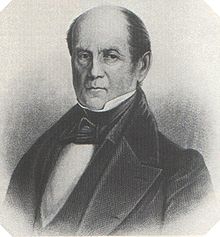Martin Chittenden
Martin Chittenden (born March 12, 1763 in Salisbury , Litchfield County , Colony of Connecticut , † September 5, 1840 in Williston , Vermont ) was an American politician, lawyer, congressman and governor of the US state of Vermont.
Youth - son of a career politician
Martin Chittenden was born in Salisbury in 1763 as the son of the politician and lawyer Thomas Chittenden , who moved with his family to Vermont 13 years later to help found the city of Williston. Here the older Chittenden started an impressive political career that made him long-term governor of his new home. Between 1777 and 1797 Thomas Chittenden was the first man in the state for around 18 years.
The lawyer
In 1789 Martin Chittenden graduated from Dartmouth College in Hanover in the neighboring state of New Hampshire , where his father had also studied years earlier. Shortly afterwards he took part as a delegate to the constituent assembly that was supposed to adopt the constitution of the United States . After Martin Chittenden held several positions in the judiciary of the state in the Jericho area , he was appointed Chief Justice of Chittenden County in 1796 , which was ironic, but ultimately a consequence of the dominant position of his family.
Congressman
In 1803 he was elected as a federalist to the United States House of Representatives , where he held his seat until 1813. In the same year, the Vermont electors named him governor of their state. He succeeded his brother-in-law, Jonas Galusha , who was ten years his senior , the husband of his sister Mary, who had meanwhile moved to the opposing political camp of the Democratic Republicans , but was also supposed to replace him in office.
Political failure as governor
Chittenden took over his office in a precarious political situation. As a result of the war of 1812 between the United Kingdom and the United States, the military conflict also threatened the border with nearby Canada and thus the existence of Vermont.
Knowing that British troops were moving towards Plattsburgh , New York State , members of the Vermont militia asked to intervene. Chittenden officially rejected this on November 10, 1813, as it would not affect Vermont affairs "beyond the limits of this state" , even if the militia leaders claimed that this was a result of pressure from his political advisers. Indirectly, however, this attitude was personally interpreted as opportunism or even cowardice, so that his political career came to an end after his election in 1815, although Chittenden himself had made it to major general of the militia (1803).
After retiring from politics, Martin Chittenden worked from 1821 to 1823 as a judge for wills and died at the old age of 77 in 1840 in Williston, where he was also buried in the old cemetery.
literature
- Walter H. Crockett: Vermonters: A Book of Biographies. Stephen Daye Press, Brattleboro 1931
Web links
- Martin Chittenden in the Biographical Directory of the United States Congress (English)
- Martin Chittenden in the database of the National Governors Association (English)
- Martin Chittenden in the database of Find a Grave (English)
- Proclamation Concerning the Militia, November 1813 (English)
| personal data | |
|---|---|
| SURNAME | Chittenden, Martin |
| BRIEF DESCRIPTION | American politician and lawyer |
| DATE OF BIRTH | March 12, 1763 |
| PLACE OF BIRTH | Salisbury , Connecticut |
| DATE OF DEATH | September 5, 1840 |
| Place of death | Williston , Vermont |


